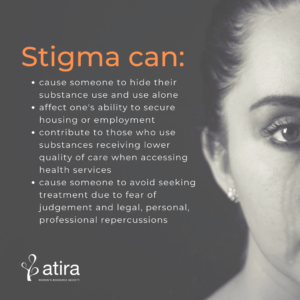Stigmatization
WHAT IS STIGMATIZATION?
The World Health Organization (WHO) described stigma as detrimental. WHO asserted that stigma is one of the most significant reasons for discrimination, marginalization and exclusion which in the end contributes to human rights violation. The concept stigma denotes the immensely powerful representation of negative perception, one which is widely associated with struggling with substance use. It is disapproval, which occurs when an individual or a group of people are deemed less than or inadequate because of their perceived health status or social characteristics.

Stigma has the potential to act as a barrier hindering those suffering with substance use or opioid use disorder from accessing treatment, health and social services, which makes it a public health issue — it contributes to high rates of death and mental health concerns among dependent populations. Stigma can be harmful because it can create real barriers for people who may be trying to access essential services, creating a perpetual cycle which can lead to people being further marginalized.
People who experience substance use disorders are experiencing a legitimate health issues, and shaming someone who is sick in this sense is stigmatization. There is a serious need to understand that addition in its essence is a very complex disorder which requires attention and adequate treatment like other diseases. Internalizing this thought can aid the wiping out false notion of substance use disorders being an aftereffect of moral failure of character or an imperfect personality.
HOW CAN I COMBAT STIGMA?
To urge individuals to look for help and move towards recuperation, it is vital to reduce the stigma encompassing their circumstance. Modeling non-stigmatizing conduct or behavior can help combat stigma and offer emphatic support.
Effective acts that help reduce stigma:
- Provide compassionate support.
- Use person-centred language, for example say “people who use substances” instead of “drug users”.
- Expressing care and kindness to the disadvantaged.
- Speak up when someone is being treated or spoken to/about in a disrespectful manner.
- Hear their story without judging.
- Do not judge a book by its cover: see them for who they are and not the substances they use.
- Educate yourself: understand dependency on substances, what it means and how it works.
- Change your approach: replace negative thoughts and behavior with data proven and evidence-based facts.
- See something, say something: at the sight of someone being abused for substance use, it should be reported.
- Being respectful of everyone should be with no exceptions (Villa, 2021).
RESOURCES:
Sources:
- Link, B. G., & Phelan, J. C. (2001). Conceptualizing Stigma. Annual review of Sociology, 363-385.
- National Academy of Sciences. (2016). Understanding Stigma of Mental and Substance Use Disorders – Ending Discrimination Against People with Mental and Substance Use Disorders.
- Villa, L. MPH. (2021). Shaming the Sick: Addiction and Stigma.
- Statistics Canada.
If you need support, contact us at 604-681-4437 or call our 24/7 call-in support line at 604-880-8881.
